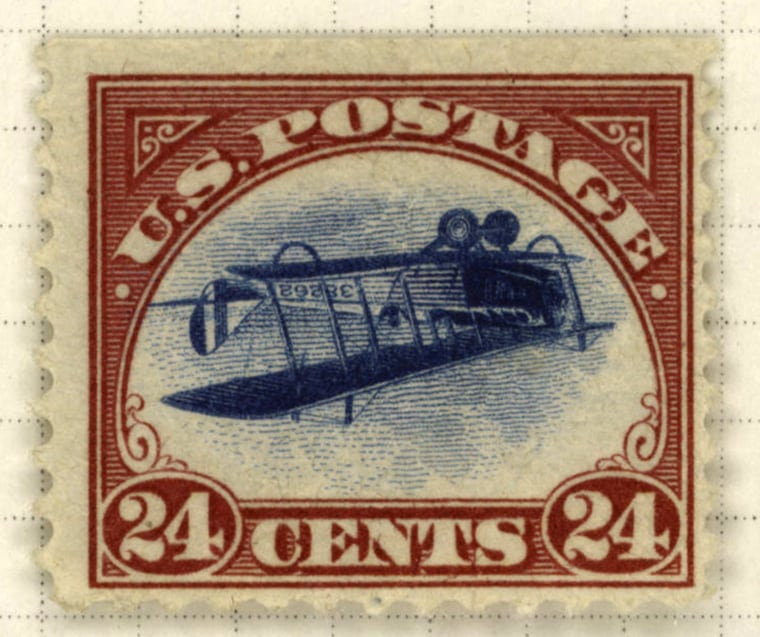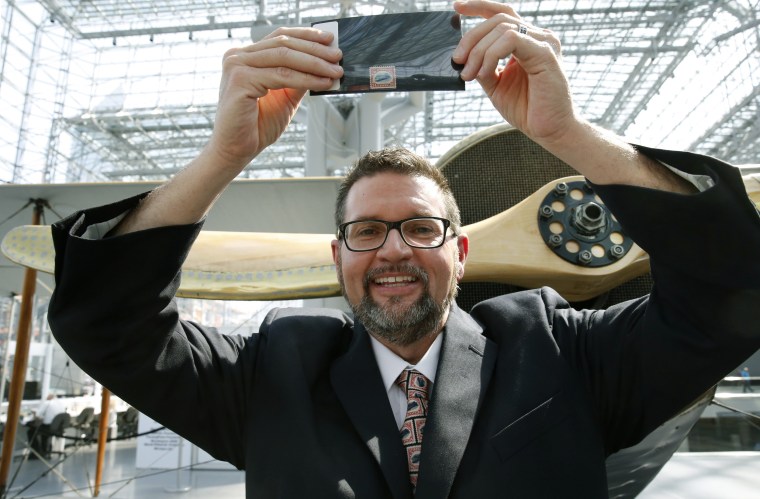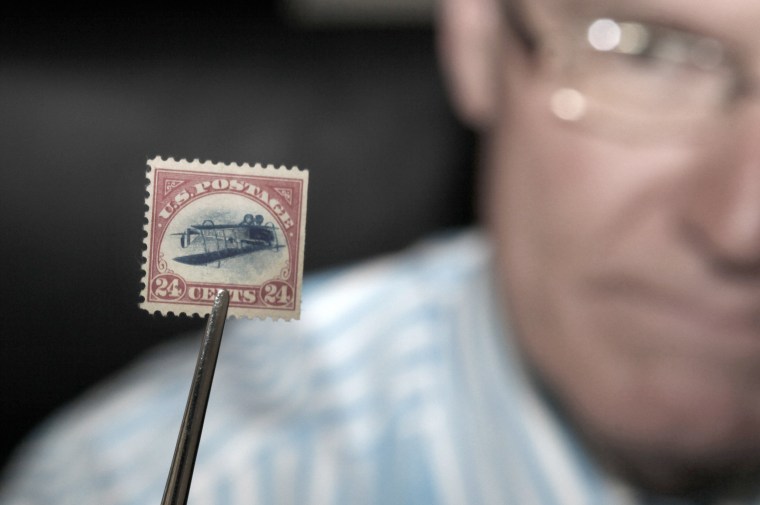It was swiped from a display case at a convention in 1955. Now, six decades later, a rare misprinted stamp known as an "Inverted Jenny" has been returned to its owner.
Federal authorities announced the handover Thursday at the World Stamp Show in Manhattan, two months after a man who inherited it from his grandfather brought it to an auction house and then waived claims to it after learning it was stolen property.
"They did the right thing," Manhattan U.S. Attorney Preet Bharara said of the man, Keelin O'Neill, who received a $50,000 reward for the stamp, which could be worth up to $200,000.
O'Neill, who is from Northern Ireland, expressed no regrets. "It's been a great experience overall," he told reporters, wearing a tie emblazoned with images of one of the most famous stamps in U.S. history.
The mystery of the missing stamp has long fascinated philatelists. It's a tale that stretches back to 1918 when a collector bought a sheet of 100 airmail stamps at a Washington post office and discovered to his delight that the image of a biplane was accidentally printed upside down.

The 24-cent stamps were numbered on the back and sold off to postage enthusiasts, and four of them wound up in the collection of a wealthy New York woman, Ethel McCoy, who paid $16,000 for the quartet.
In September 1955, she put them on display at a show in Norfolk, Virginia, where they were brazenly stolen despite tight security.
“The thief cut a cord binding two of the exhibit frames and slid back the covering sheet of glass several inches," author George Amick wrote in his 1986 book, "The Inverted Jenny: Mystery, Money, Mania."
Diego Rodriguez of the FBI's New York office said it was a whodunit from the start.
"There were no witnesses, no suspects and very little evidence to pursue," he said.
One of the four stamps, No. 75, resurfaced in Chicago in 1977 and was seized by the FBI; McCoy donated it to the American Philatelic Research Library. Another one, No. 65, turned up in New York in 1981 and was donated to library, which was given ownership rights by McCoy before her 1980 death.
The whereabouts of the last two stolen Jennys — nicknamed as such because the misprinted plane was a Curtiss JN-4 model — remained a riddle.
Fast forward to March of this year, when O'Neill contacted the Spink auction house and said he thought he had found an Inverted Jenny in a box he inherited from his grandfather, who had bought it at a rummage sale.
"I had no idea about the history and importance of the stamp," O'Neill said.
George Eveleth, the head of the philatelic department at Spink, said he at first assumed it was a forgery.
"I didn’t take it seriously because I know where 90 of the 100 are," Eveleth said. "The chances of him having the real McCoy, so to speak, were between slim and none."
O'Neill made an appointment to bring the stamp to Spink's New York office in mid-March, but he never showed up.

Eveleth said he guessed the young man had determined the stamp wasn't real after all. In actuality, Eveleth said, O'Neill got to New York and decided to take a detour, traveling to Florida for spring break.
Two weeks later, he re-emerged in New York, Jenny still in hand, and presented it to Spink. The specimen had been altered at some point in its history, probably to hide its identity, and Spink's experts couldn't immediately determine if it was genuine.
They brought it to the Philatelic Foundation, where experts confirmed that it was, indeed, the stolen Inverted Jenny No. 76. Scott English of the American Philatelic Society got the FBI involved, and the stamp was put under a protective order through the federal courts until it was legally transferred to the research library.
Although the Jenny has been turned over to the rightful owner, O'Neill won't go away empty-handed. He got a check for $50,00 from the Mystic Stamp Company, which offered the reward several years ago in hopes of cracking the ice-cold case.
No. 76 is worth between $150,000 and $200,000, according to English. Another Jenny sold just a few days ago for more than $1 million, but the stolen stamp is not in as good condition.
Its discovery has thrilled the stamp-collecting world. Even Bharara, the federal prosecutor, said he was captivated by the case, having collected stamps himself as a child.
But key questions about remain unanswered, including who stole the McCoy block in 1955, where the fourth purloined stamp (no. 66) is now, and who had No. 76 before O'Neill's grandfather.
"That's a mystery that remains to be solved," Eveleth said.

